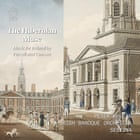Albums that sidestep familiar repertoire always deserve attention. The Irish Baroque Orchestra’s The Hibernian Muse (Linn), with the vocal group Sestina, is shaped around music played at festivals at the turn of the 18th century, one marking the centenary of Trinity College Dublin, the other celebrating the birthday of Queen Anne. The ensemble, directed by Peter Whelan, won an Olivier award earlier this year for their stylish production of Vivaldi’s Bajazet at the Linbury theatre, Royal Opera House.
Their skill and vigour, with lively singing from Sestina and soloists, shines out here in music by Henry Purcell and the Hungarian composer Johann Sigismund Cousser (1660-1727). Purcell’s collaborator on his opera Dido and Aeneas was the poet Nahum Tate, a Dubliner who later became poet laureate. Their ode Great Parent, Hail!, full of wordplay, solos, duets, choruses and a beautiful “symphony”, is a highlight. Cousser’s “serenata” for Queen Anne, The Universal Applause of Mount Parnassus, is an engaging novelty, with Lillibulero played on solo lute a wistful bonus.

The Georgian-born pianist Mariam Batsashvili was a BBC Radio 3 New Generation artist from 2017-19. This gave British audiences a chance to hear her, live or in broadcasts, at the start of her career. Still in her 20s, she has continued to display that mix of virtuosic brilliance and sensitive insight that defines her playing. In Romantic Piano Masters (Warner Classics), she includes the less well known (César Franck’s Prelude, Fugue et Variation, Op 18, transcribed by H Bauer) with the composer who has been a constant for her, to date: Franz Liszt. Batsashvili keeps plenty in reserve in his transcription of the Liebestod from Wagner’s Tristan und Isolde, delivered with control and a visionary serenity.
Throughout, this is outstanding playing, the programme thoughtfully constructed. Among her choice of operatic transcriptions she has included one by Liszt’s great pianistic rival, Sigismond Thalberg: the Grand Caprice on motifs from Bellini’s La sonnambula. A tremendous show-off piece that must have irritated Liszt, Batsashvili plays it with charm and ease, as if to say: if you can play the notes, no duel is required.

